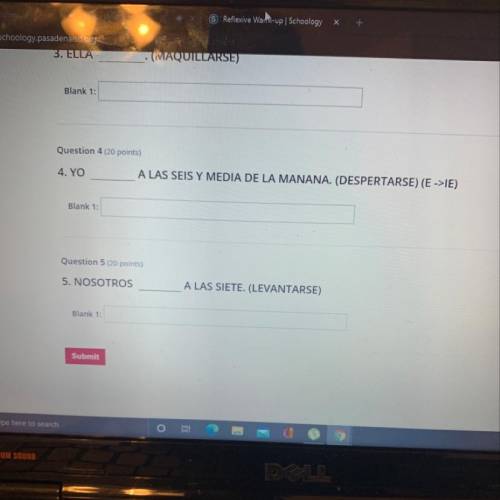
Spanish, 20.09.2020 01:01 cedarclark9534
This is a Reflexive Verb warm-up can someone help me please it’s hard learning Spanish online through video call


Answers: 2


Another question on Spanish

Spanish, 21.06.2019 22:00
Which question best completes this conversation? carlos: ¿cuántos años tienes? roberto: tengo dieciséis años. carlos: roberto: el catorce de enero. a. ¿qué es tu cumpleaños? b. ¿cuándo es tu cumpleaños? c. ¿cuál es tu cumpleaños? d. ¿cuánto es tu cumpleaños? as soon as possible 99 points for spanish
Answers: 2

Spanish, 23.06.2019 12:30
Becoming a lifelong learner learning a language opens doors to a world of opportunity. of course, in order to really benefit from your studies, you’ll need to do more than just complete assignments. you’ll need to set habits that will tie you to spanish and its cultures even beyond the classroom. students who become lifelong learners of spanish have some basic characteristics and habits that you should develop if you want to get the most from your experience learning spanish. lifelong learners: have friends with whom they regularly converse in the target language. (this could be friends in school, neighbors or friends in the community.) regularly get information from target language sources (newspapers, magazines, internet spanish related news group (with parent’s approval), tv programs, radio, etc. that are produced by and for native speakers.) participate in activities of the target culture (celebrating holidays, seeing movies or plays of/in the target culture, preparing or eating dishes from the target culture, reading books or magazines from the target culture, etc.) someone who has developed these habits is on the way to becoming a lifelong learner. these types of habits reinforce a strong connection to the language and culture and develop a love and better understanding of that culture. think for a minute about the resources available. do you have friends who are native spanish speakers? do you ever watch spanish channels on television? you can probably think of several online sources. maybe you have some stores or restaurants in your community that are owned or frequented by spanish speakers. also think about when you could participate in spanish-related activities on a regular basis—remember that it’s setting the habits that will make the most difference. using the table below as a guideline, write out a plan for starting new habits. for the language or culture resources column, try to identify three different resources: 1. a friend or contact 2. an information source, and 3. a cultural activity. in the what i will do column, describe as specifically as you can what you will do. and in the when i will do it column, write when you plan on doing these activities. see the sample below to see how you might fill out your own table. you will have opportunities to follow up and report on your regular practice of engaging spanish resources close to home. you will be asked in a follow up assignment to report on what you have done.
Answers: 3

Spanish, 24.06.2019 01:00
Choose a fruit or vegetable that is not the same color as the fruit or vegetable listed below. el tomate la manzana, la fresa la sandía la pera
Answers: 2

Spanish, 24.06.2019 05:30
¿en qué año se publicó la novela “cien años de soledad? a. 1977 c. 1982 b. 1967 d. 1975
Answers: 2
You know the right answer?
This is a Reflexive Verb warm-up can someone help me please it’s hard learning Spanish online throug...
Questions


Biology, 10.07.2019 12:30

Social Studies, 10.07.2019 12:30

Social Studies, 10.07.2019 12:30


Chemistry, 10.07.2019 12:30






Chemistry, 10.07.2019 12:30


English, 10.07.2019 12:30

History, 10.07.2019 12:30

History, 10.07.2019 12:30

Social Studies, 10.07.2019 12:30





